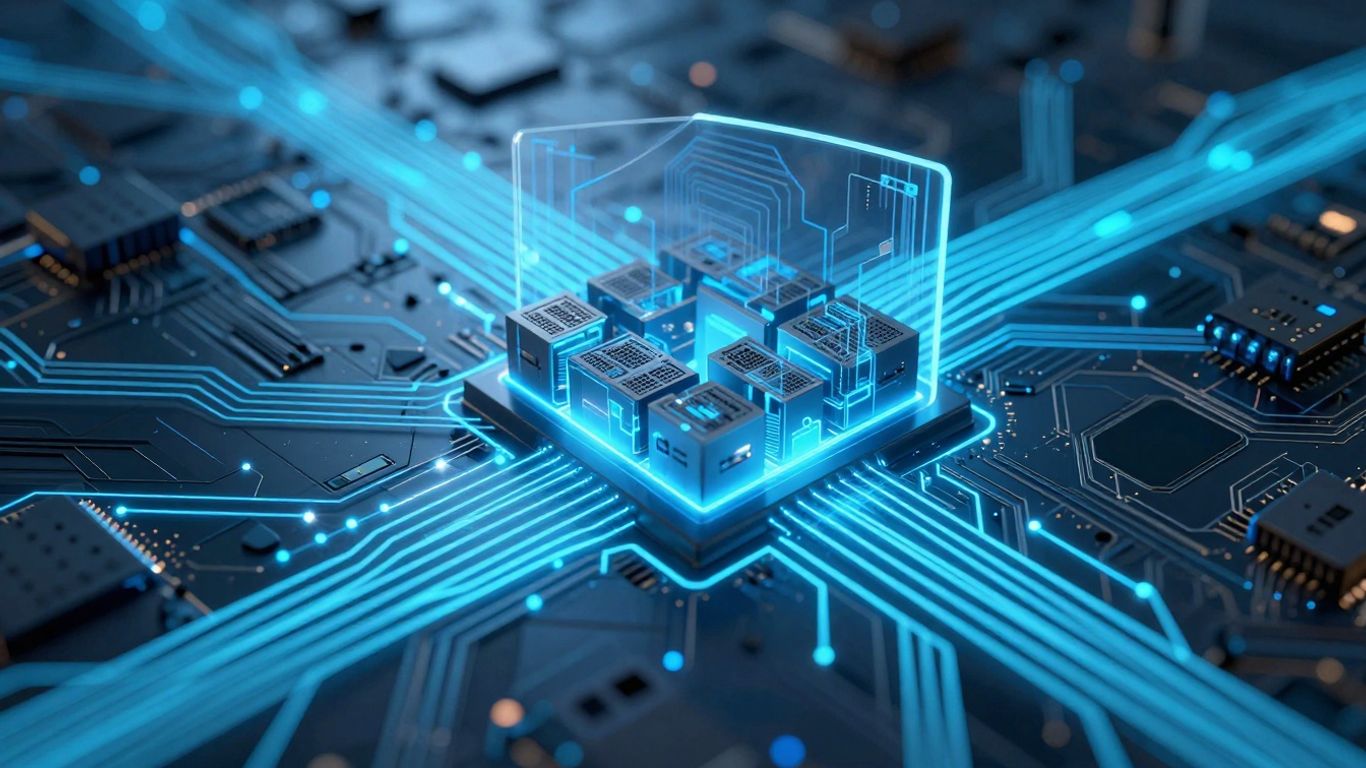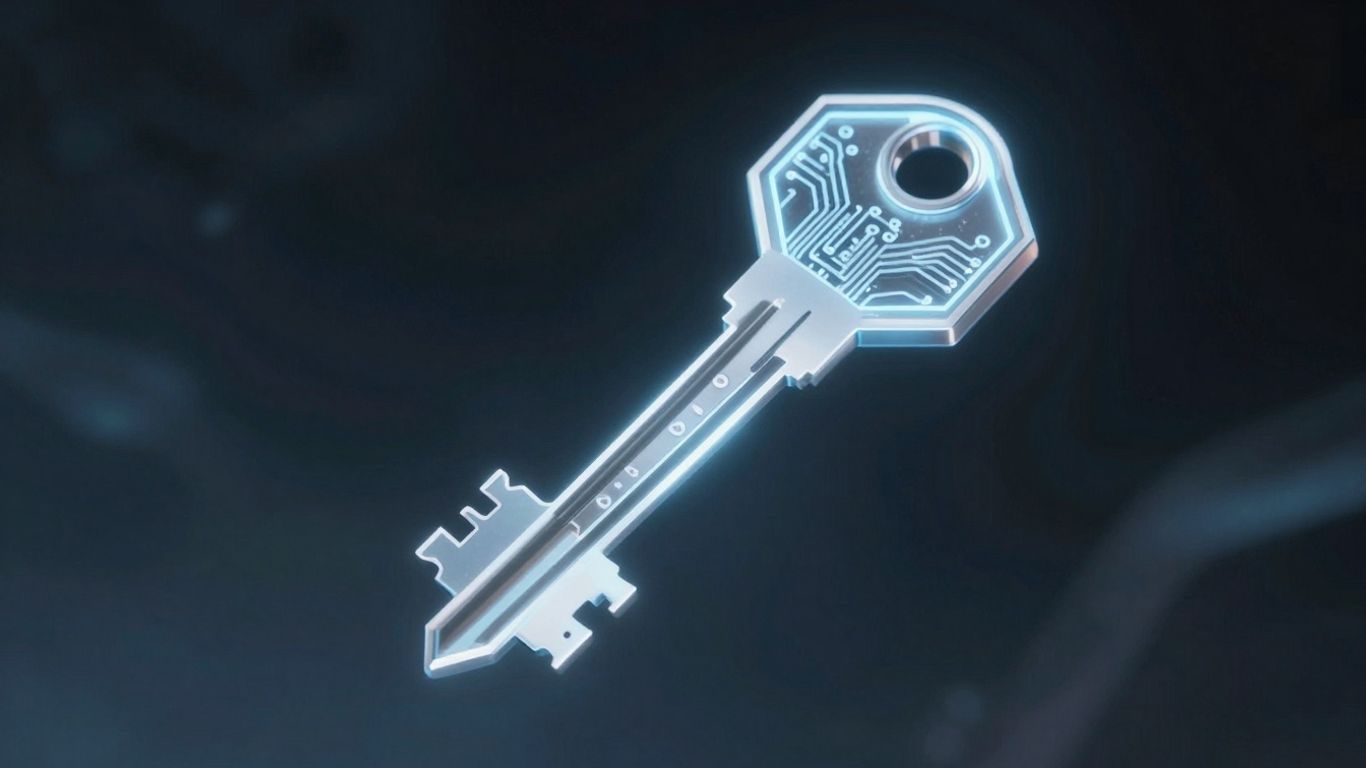[ newsletter ]
Stay ahead of Web3 threats—subscribe to our newsletter for the latest in blockchain security insights and updates.
Thank you! Your submission has been received!
Oops! Something went wrong. Please try again.
Discover how blockchain in AI is transforming industries with enhanced security, efficiency, and innovative solutions.





The combination of blockchain and artificial intelligence (AI) is creating exciting possibilities for the future. These technologies are not just changing their own fields; they’re also working together to bring about groundbreaking advancements in various industries. As we explore the role of blockchain in AI, we’ll see how they can enhance security, transparency, and efficiency, ultimately transforming the way we do business.
Okay, so blockchain. You've probably heard the term thrown around a lot. Basically, it's like a super secure, shared digital record book. Instead of one central authority controlling everything, the information is spread across many computers. This makes it really hard to tamper with the data. Think of it as a chain of blocks, where each block contains information, and each block is linked to the one before it, making the whole thing very secure. Blockchain Development Services are becoming increasingly important.
AI, or Artificial Intelligence, is all about making computers think and act like humans. This involves things like learning from data, recognizing patterns, and making decisions. There are different types of AI, from simple systems that can do one specific task to more complex systems that can handle a variety of tasks. AI is used in everything from self-driving cars to recommendation systems on streaming services. It's a pretty broad field, and it's evolving super fast. AI can bring a new level of intelligence to blockchain-based business networks.
So, what happens when you put blockchain and AI together? Well, that's where things get really interesting. Blockchain can provide a secure and transparent platform for AI applications, while AI can help to automate and optimize blockchain processes. For example, AI can be used to analyze blockchain data to identify fraud or to improve the efficiency of transactions. It's a powerful combination that has the potential to transform a wide range of industries. AI, automation and blockchain can bring new value to business processes.
Combining blockchain and AI can lead to more trustworthy and efficient systems. Blockchain provides the data integrity and security, while AI provides the intelligence and automation. This synergy can help to solve complex problems and create new opportunities across various sectors. It's not just about using the technologies separately, but about how they can work together to create something better.
Here's a quick look at some potential synergies:
Blockchain tech brings some serious muscle to data security. Instead of keeping everything in one place that's easy to hack, blockchain spreads data across many computers. This makes it way harder for anyone to mess with the info without getting caught. Think of it like this: if a hacker wants to change something, they have to change it on every single computer in the network, which is nearly impossible. This is especially useful for things like blockchain identity and keeping personal info safe.
AI can really help make things clearer when it comes to how data is used and managed. AI algorithms can track data as it moves through a system, making sure everyone knows where it came from and who has touched it. This is super important for building trust, especially in areas like supply chains or finance. Plus, AI can spot weird patterns or activities that might point to fraud or other problems.
When you put blockchain and AI together, you get a system that's not only secure but also really transparent. Blockchain makes sure the data is tamper-proof, and AI makes sure everyone can see what's going on with the data. This combo is a game-changer for industries that need to build trust, like healthcare or finance. For example, in healthcare, it can help with patient tracking and managing consent. In finance, it can secure financial transactions and speed up processes.
It's like having a super-secure, see-through vault. Everyone can see what's inside, but no one can mess with it without everyone else knowing. This level of security and transparency is what makes this combo so powerful.
It's interesting to see how blockchain and AI, when combined, are starting to change things across different industries. It's not just about making things faster; it's about creating new ways of doing business and solving problems. Let's take a look at some specific examples.
Healthcare is seeing some pretty cool changes thanks to blockchain and AI. Imagine a system where patient data is super secure and easily accessible to doctors, but only with the patient's permission. That's what blockchain can help improve trust. AI can then analyze this data to help doctors make better diagnoses and treatment plans. It's like having a super-smart assistant that never gets tired.
Finance is another area where blockchain and AI are making waves. Think about faster, more secure transactions, and fraud detection that's way better than what we have now. AI can analyze transaction patterns to spot suspicious activity, while blockchain ensures that every transaction is recorded and verified. It's a win-win for security and efficiency.
Supply chains can be a real mess, with so many different players and moving parts. Blockchain and AI can help bring some order to the chaos. Blockchain can track products as they move from one place to another, while AI can predict potential disruptions and optimize logistics. This means fewer delays, lower costs, and happier customers. For example, you can use AI solutions to track goods.
Combining blockchain and AI in supply chain management can lead to significant improvements in transparency and accountability. This is especially important for industries where product origin and authenticity are critical, such as food and pharmaceuticals.

It's interesting to think about how blockchain and AI, when combined, can really change how businesses operate. We're talking about making things faster, cheaper, and way more automated. It's not just about cutting costs; it's about creating entirely new ways of doing things.
Smart contracts are already pretty cool, but when you add AI to the mix, they become supercharged. Imagine contracts that can adapt to changing conditions, automatically renegotiate terms, or even resolve disputes without human intervention. AI can analyze data to predict potential issues and adjust the contract accordingly. It's like having a lawyer and a fortune teller built into your code.
Think about all the steps involved in a typical business process – approvals, verifications, data entry, etc. AI can automate many of these tasks, freeing up employees to focus on more strategic work. Blockchain ensures that all the data is secure and transparent, so everyone can trust the process. It's a win-win.
By automating tasks and streamlining processes, businesses can significantly reduce their operational costs. AI can identify areas where resources are being wasted and optimize them for maximum efficiency. Blockchain eliminates the need for intermediaries, further reducing costs and increasing transparency. For example, AI automation can handle repetitive tasks, freeing up human employees.
Combining AI and blockchain is not just about saving money; it's about creating a more efficient, resilient, and innovative business. It's about building systems that can adapt to change and make better decisions, faster.
Okay, so what's next for blockchain and AI? I think we're going to see some really interesting stuff popping up. Think about personalized medicine, where AI analyzes your genetic data (stored securely on a blockchain, of course) to create custom treatments. Or maybe even AI-powered smart contracts that automatically handle complex legal agreements. The possibilities are pretty wild.
It's tough to put exact numbers on it, but most analysts agree that the blockchain and AI market is going to explode. We're talking serious growth in the next few years. A lot of this will be driven by companies looking to cut costs, improve security, and get a better handle on their data. I'm seeing a lot of buzz around AI solutions in the financial sector, and I think that's just the tip of the iceberg. Here's a quick look at projected growth:
It's not all sunshine and rainbows, though. There are definitely some hurdles to overcome. One big one is regulation. Governments are still trying to figure out how to deal with blockchain and AI, and that uncertainty can slow things down. Another challenge is talent. There just aren't enough people with the skills to build and maintain these systems. But, with challenges come opportunities. Companies that can navigate the regulatory landscape and attract top talent are going to be in a great position to succeed. Also, the need for blockchain development services will continue to grow.
One thing I'm really excited about is the potential for blockchain and AI to create more equitable systems. By making data more transparent and accessible, we can level the playing field and give everyone a fair shot.
Here are some key opportunities:
Okay, so, data provenance. It's basically knowing where your data came from, right? Think of it like tracing the ingredients in your favorite dish back to their source. With AI, especially when it's making big decisions, you really need to know this. If the data is bad, the AI's decisions will be bad too. Blockchain can help with this by creating a secure, immutable ledger that tracks every step of the data's journey. This makes it way easier to audit and verify the data's integrity.
AI can be a black box sometimes. You feed it data, and it spits out an answer, but you have no idea how it got there. That's where explainable AI (XAI) comes in. It's all about making AI's decision-making process more transparent. Combining XAI with blockchain can be a game-changer. Blockchain provides a secure record of the data used to train the AI, while XAI helps us understand how the AI is using that data to make decisions. This is super important for things like medical diagnoses or loan applications, where you need to understand why the AI made a certain decision.
If people don't trust AI, they won't use it. Simple as that. And a big part of building trust is making sure people understand how the AI works. When you can clearly explain how an AI system arrived at a particular conclusion, people are much more likely to accept it. Blockchain can play a role here by providing a verifiable record of the AI's training data and decision-making process. This can help to improve trust and boost user confidence in AI systems.
It's not just about making AI smarter; it's about making it trustworthy. People need to feel confident that AI is making fair and unbiased decisions, and that requires transparency and accountability.
Here's a simple example of how data provenance might be tracked:
And here are some ways to build user confidence:

Okay, so we've talked a lot about what blockchain and AI can do together. But what does that actually look like in the real world? Turns out, there are some pretty cool things happening already. It's not all just theory anymore; companies are actually using these technologies to solve problems and make things better. Let's explore AI solutions in practice.
Let's check out some examples. In healthcare, blockchain is being used to securely store and share patient data, while AI helps analyze that data to improve diagnoses and treatment plans. Think about it: no more lost medical records and faster, more accurate diagnoses. In finance, we're seeing blockchain used for secure transactions and AI for fraud detection. It's like having a super-smart, unhackable accountant. And in supply chain management, blockchain tracks products from origin to consumer, while AI optimizes logistics and predicts potential disruptions. It's all about making things more efficient and transparent. These are just a few examples, but they show the potential of combining these two technologies.
I was reading about this one company that uses blockchain and AI to track diamonds from the mine to the store. It's pretty wild. They use blockchain to create a permanent record of each diamond's journey, and AI to verify its authenticity and ensure it's not a conflict diamond. This not only helps consumers make ethical choices but also protects the company's reputation. Then there's another company using AI-powered smart contracts to automate insurance claims. The AI analyzes the claim, verifies the details, and automatically releases the payment if everything checks out. No more waiting weeks for your claim to be processed! It's all about blockchain development services making things faster and more reliable.
Okay, so it's not all sunshine and roses. There have been some challenges along the way. One of the biggest is data privacy. When you're dealing with sensitive information, you need to make sure you're protecting people's privacy. Another challenge is scalability. Blockchain can be slow and expensive, so you need to find ways to make it more efficient. And then there's the regulatory uncertainty. Governments are still trying to figure out how to regulate these technologies, which can make it difficult for companies to innovate. But despite these challenges, the potential benefits are huge. As these technologies mature and regulations become clearer, we're going to see even more amazing applications of blockchain and AI. It's an exciting time to understand blockchain technology.
One thing I've noticed is that the most successful implementations are the ones that focus on solving a specific problem. They don't just try to use blockchain and AI for the sake of using them. They identify a real need and then use these technologies to create a solution. It's all about finding the right tool for the job.
As we look ahead, the combination of blockchain and AI is shaping up to be a game changer. These technologies are not just buzzwords; they’re tools that can really change how industries operate. From healthcare to finance, the potential is huge. Blockchain can secure data, while AI can analyze it in ways we’ve never seen before. Sure, there are challenges to tackle, but the benefits are hard to ignore. It’s clear that as these two fields grow together, they’ll create new opportunities and solutions that could redefine our digital landscape. So, keep an eye on this space—it's going to be exciting!
Blockchain is a special kind of technology that keeps a shared record of transactions across many computers. This means that once something is added, it cannot be changed easily, making it very secure.
AI is when machines are made to think and learn like humans. They can gather information, make decisions, and improve themselves based on what they learn.
When blockchain and AI are combined, they can make each other better. Blockchain provides a safe space for AI to work, while AI can help make blockchain faster and more efficient.
Many industries can benefit, such as healthcare, finance, and supply chains. For example, in healthcare, blockchain can keep patient records safe, and AI can help doctors make better decisions.
Smart contracts are self-executing contracts with the terms written into code. They can automatically perform actions like making payments when certain conditions are met.
Some challenges include the need for better understanding of these technologies, ensuring privacy, and dealing with the costs of implementation.


